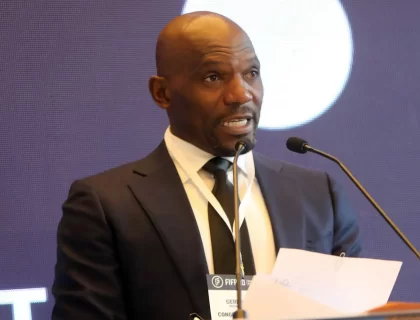Crude Crash: FG’s 2025 Budget Jumps Again, Marketers Anticipate Price Cut
The global decline in crude oil prices has further threatened Nigeria’s 2025 budget, while fuel marketers anticipate a potential reduction in petroleum product prices.
Experts who spoke with our correspondent noted that the crude oil price drop, caused by tariffs imposed by U.S. President Donald Trump, has both positive and negative effects on Nigeria’s economy.
On one hand, the Federal Government will face losses due to reduced revenue from crude oil, while on the other hand, the public could benefit from lower fuel prices at the pumps.
According to our correspondent, crude oil prices began to fall over the weekend, dropping to $65 per barrel by Saturday.
On Monday, oil prices fell further, with Brent crude dropping to $64.16 and the U.S. WTI falling to $60.73.
According to oilprice.com, the combined impact of President Trump’s import tariffs, OPEC+’s hasty decision to accelerate the unwinding of production cuts, and China’s retaliatory actions resulted in a $10 per barrel drop in global oil prices. This caused ICE Brent to fall below $65 per barrel for the first time since August 2021.
The retaliatory tariffs imposed by China on U.S. goods are said to have intensified the trade war, leading investors to factor in a higher likelihood of an impending recession.
China, the world’s largest oil importer, announced it will impose an additional 34 percent tariff on all U.S. goods starting April 10.
According to Reuters, countries worldwide have prepared to retaliate after President Trump raised tariffs to their highest levels in over a century.
In addition to the tariffs, another factor putting pressure on oil prices is the decision by the Organization of the Petroleum Exporting Countries (OPEC) and its allies to accelerate plans for increasing oil production.
The group now plans to bring 411,000 barrels per day back to the market in May, up from the earlier scheduled 135,000 bpd.
As crude oil prices continue to decline, the Federal Government is facing the challenge of compensating for the revenue shortfall that could arise in the 2025 budget.
Federal Government had initially set the price of crude oil at $75 per barrel.
Crude oil remains the country’s primary source of revenue.
As crude oil prices dropped $10 below the projected $75 per barrel, the expected revenue became unrealistic, particularly due to the Federal Government’s failure to increase daily crude oil production to the target of two million barrels per day.
The budget is based on a benchmark oil price of $75 per barrel and an ambitious production goal of 2.06 million barrels per day. Around N19.60 trillion, or 56 percent of the initially projected N34.8 trillion in revenue, is expected to come from oil, highlighting Nigeria’s heavy dependence on oil for fiscal stability.
Clement Isong, Executive Secretary of the Major Energy Marketers Association of Nigeria, stated that the crash in crude oil prices is detrimental to the nation’s economy, especially considering the budget projections.
Isong noted that it is evident the world is in a state of turmoil, and that the current situation is unprecedented.
He said, “We have had the market crash a few times, I think in 2008, and I can’t remember what the last one was, maybe 2014. But it has never been this bad. I’m talking about globally.
“Fortunately, this is man-made. It is because one person stood up and did something. So, it also means that if he can compromise, or they can work out some compromises, it might be reversed. But is there a negative impact on my country? Yes, as usual, it’s a negative and positive impact.”
He emphasized that the low crude oil prices are extremely harmful to the budget, given the benchmark set for oil prices.
“The extremely low price of crude oil at $65 per barrel is really bad based on the benchmark that was used for the budget for this year. So, if it should last, it means that the deficit would be even worse than what was anticipated. It’s really bad news for the expected revenues for the country,” Isong said.
The MEMAN boss also said the low crude price may affect investments, especially with the cost of production.
“Hopefully, it will not impact too much on investments, because, as you recall, we have had insufficient investments in our upstream, leading to the decline in our crude oil output. Normally, in the world, when crude oil prices are high, those who invest in production bring out more money.
“Remember that Nigeria’s production cost is quite high because a lot of new production is deep offshore. So, because deep offshore is so expensive, you really need the cost of the crude to be as high as possible in order to generate the revenue that the country needs to fund its ambitious development programme. So, it’s both negative and positive.
Isong said the $40 production cost per barrel has gone down.
“I hope we can push it down. But $66 per barrel is not very interesting. It’s not very good for us,” he stated.
However, the energy expert maintained that the crash would also impact pump prices, bringing down the cost of fuel.
“With respect to prices at the pump, over time, I guess, they will go down. If the crash is continuous, fuel prices will go down, and that will provide some relief to commuters and transporters of goods. So, it has a dual impact,” he submitted.
Billy Gillis-Harry, the National President of the Petroleum Products Retail Outlet Owners Association of Nigeria, explained that the crude oil price crash will have both positive and negative effects on the economy.
He stated that Nigeria relies too heavily on oil sales to fund its budget, and a drop in oil prices could be disastrous for the country.
For fuel retailers, he noted that fuel prices will continue to fluctuate without stability, adding that the price of petrol is now nearing N1,000 per litre.
He urged the government to focus on developing the internal economy, suggesting that U.S. President Trump’s decision to raise tariffs from five percent to 14 percent should push the government to explore other revenue sources.
Gillis-Harry also mentioned that retail outlets should expect a reduction in pump prices, as the cost of feedstock is decreasing.
“Fuel reduction should normally be expected because the cost of the feedstock is part of the cost of production. If the crude price reduces, it will affect the price. But we don’t know when the price cut can happen.
You may be interested

Inter Begin Contract Talks with Akinsanmiro
gisthub - Jun 13, 2025Inter Milan have initiated contract renewal discussions with Nigerian midfielder Ebenezer Akinsanmiro, signaling their intent to secure the 20-year-old's future beyond his current…

Ondo State Courtrooms Closed Following Judiciary Staff Strike
gisthub - Jun 13, 2025Courts across Ondo State have come to a grinding halt as the Judiciary Staff Union of Nigeria (JUSUN), Ondo State chapter, launched an…

Nigeria’s Fencers Begin Intensive Camp Ahead of African Championships
gisthub - Jun 13, 2025A dozen Nigerian fencers officially kicked off their final preparation camp on Thursday, ahead of the much-anticipated 2025 African Fencing Championships set to…
Most from this category

Transfer: Geremi Explains Why Ronaldo Can No Longer Play In The EPL
gisthub - Jun 13, 2025












Leave a Comment